'We Feel Like the Ministers Are Working Against Us'
Former and current civil servants, some of whom served in very senior positions, describe a situation of ongoing erosion, severe staff shortages, political appointments, delayed projects and a public sector that is losing the ability to do its job. There’s a reason Israelis feel as if their country is no longer functioning and a glimpse behind the curtain shows exactly why. On a sense of mission that is being worn away – and a system that will pay the price for many more years. Voices From Within Israel’s Crumbling Ministries.


Former and current civil servants, some of whom served in very senior positions, describe a situation of ongoing erosion, severe staff shortages, political appointments, delayed projects and a public sector that is losing the ability to do its job. There’s a reason Israelis feel as if their country is no longer functioning and a glimpse behind the curtain shows exactly why. On a sense of mission that is being worn away – and a system that will pay the price for many more years. Voices From Within Israel’s Crumbling Ministries.

Former and current civil servants, some of whom served in very senior positions, describe a situation of ongoing erosion, severe staff shortages, political appointments, delayed projects and a public sector that is losing the ability to do its job. There’s a reason Israelis feel as if their country is no longer functioning and a glimpse behind the curtain shows exactly why. On a sense of mission that is being worn away – and a system that will pay the price for many more years. Voices From Within Israel’s Crumbling Ministries.
Photos: Shutterstock

Haim Rivlin
September 18, 2025
Summary


Listen to a Dynamic Summary of the Article
Created using NotebookLM AI tool
Why are there so few traffic cops on Israeli roads? Why is there no national plan to fight traffic accidents? Why did no government body function properly in the days, weeks and months after the outbreak of the war? Why are national projects on ice and why is the public sector so slow and byzantine? In an effort to fully understand the roots of the crisis in the civil service, Shomrim approached government employees themselves. Many refused to discuss the topic, but six of them agreed – after much deliberation and concern – to share an insider’s view of what is really happening.
As a journalist for many years, I have had professional relationships with dozens of civil servants – men and women from different ministries, dedicated professionals in the classic sense. I have never heard them talk like this before. The monologues that we present below were written by people who entered public service out of a deep sense of mission. Some of them were broken and recently left their positions. Others freely admit that they ask themselves on a daily basis whether it’s time to retire.
It would be easy to dismiss them as politically motivated, but the truth is much simpler: there are public servants who are motivated by a desire to serve their people. They protect us from factories that pollute our water and air, they plan an efficient system of public transport, they prepare national infrastructure for decades ahead, they develop affordable housing and are involved in countless other critical aspects of our lives. They have worked under many different ministers and governments, but they all claim that there has never been a government that has undermined the civil service to the extent that the current one has.
We offer a rare glimpse into a system that is being dismantled.
1. A senior employee in a government ministry
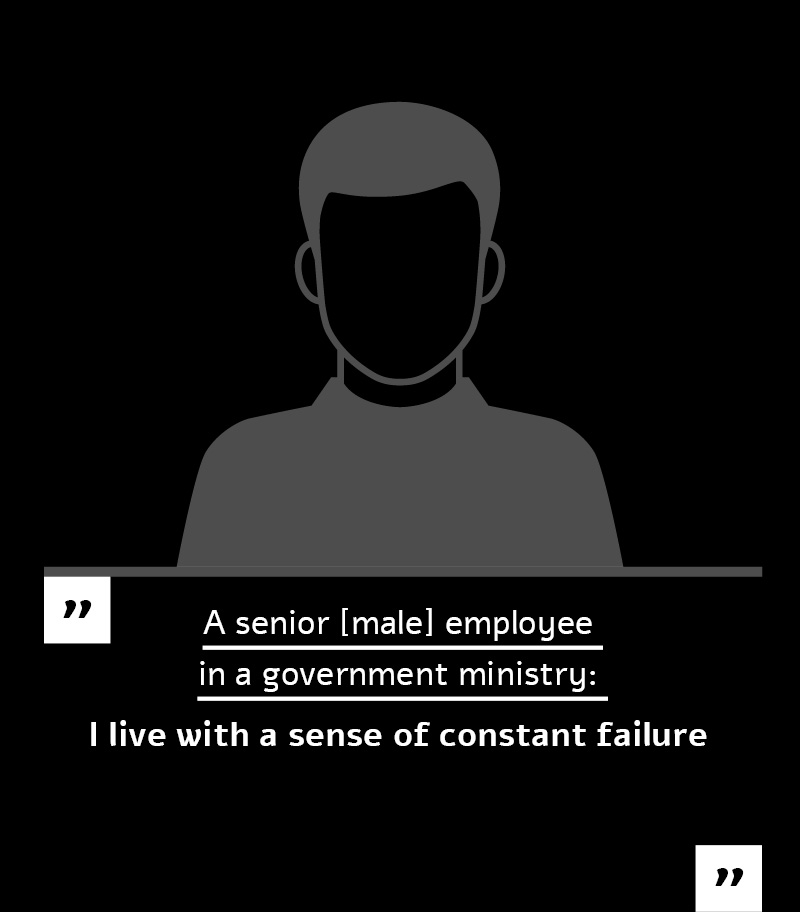
The staffing standard for my team is four employees, but for three years we’ve only had two. Before I started in this position, the head of the team worked alone for several years. At the same time, the assignments just kept piling up. The few people who entered the tender withdrew as soon as they found out the salary, so we had no choice but to lower the acceptance level to a minimum, just to fill the empty positions. Nobody wants to work in the public sector. I’ve been in this ministry for two decades and the situation is only deteriorating. Our public image is terrible and I feel like I am not living up to the expectations of our “customers.”
People come to me with requests or plans that need approval, but it can take months before I get round to dealing with them. At the beginning, I tried to explain that “We just don’t have the manpower” and I was rightly criticized. Now, I just apologize in advance: “You’re right, I just didn’t have time to get round to it.” I used to enjoy my work; it was fulfilling and there was a genuine sense of mission. Today, I live with a feeling of constant failure and I take that feeling home with me, too.
The situation is similar in other ministries. Everyone’s dealing with severe understaffing and difficulties recruiting new employees. Some of them have even turned to external advisors to deal with the problem. So, you get a situation whereby a civil servant leaves their job and then comes back to do exactly the same work as an external advisor – for more pay.
The outcome is dangerous: professional and organizational expertise is disappearing. In a few years from now, most of the longest-serving civil servants will have retired and there’s no transitional generation to which they can pass on their expertise. The strict rules enforced by the Civil Service Commission make the situation even worse: you can’t publish a tender for a replacement as long as the employee who is leaving is still in the job. So, we face the absurd situation of only starting to look for a replacement once that person has retired; the best-case scenario is that it takes a few months – and then there’s the whole issue of training them to do the job.
This kind of foot-dragging is intolerable. In the private sector, it’s a much speedier process: they publish a tender, conduct interviews and, within a month, the new employee starts work. In the civil service, even after you’ve conducted all the interviews, there are countless forms to fill out and you even have to go to the main office in Jerusalem – even if the job’s in Nazareth, Haifa or Be’er Sheva. As a result, people simply aren’t entering the public sector. In our ministry, the situation is that there is an echelon of veteran employees and another of young people – where the turnover is high – and there’s no middle generation.
I have worked under many different ministers. Some of them took more interest, while others saw the position as a punishment – but, for the most part, they at least didn’t interfere. Under the current government, there’s a sense that the ministers are working against us. And the ability of professional employees to withstand the pressure is being eroded. At meetings of district committees, you can see representatives of the ministries squirming in front of the interested parties. Twenty years ago, I got a letter from someone who identified themselves as a party member. I jokingly replied, “Nice to meet you. I’m a member of Egged (the largest public transportation operator in Israel),” and that was the end of it. Today, sometimes, I’m really scared.
Ministers want immediate achievements. But government policy is more like a massive tanker – you can’t just turn the wheel and expect it to change direction. Policy is a long-term thing. That’s inescapable. So, they busy themselves with less important things, including overbudgeting, just to show results – and they neglect everything else.
2. A senior official from the Ministry of Health
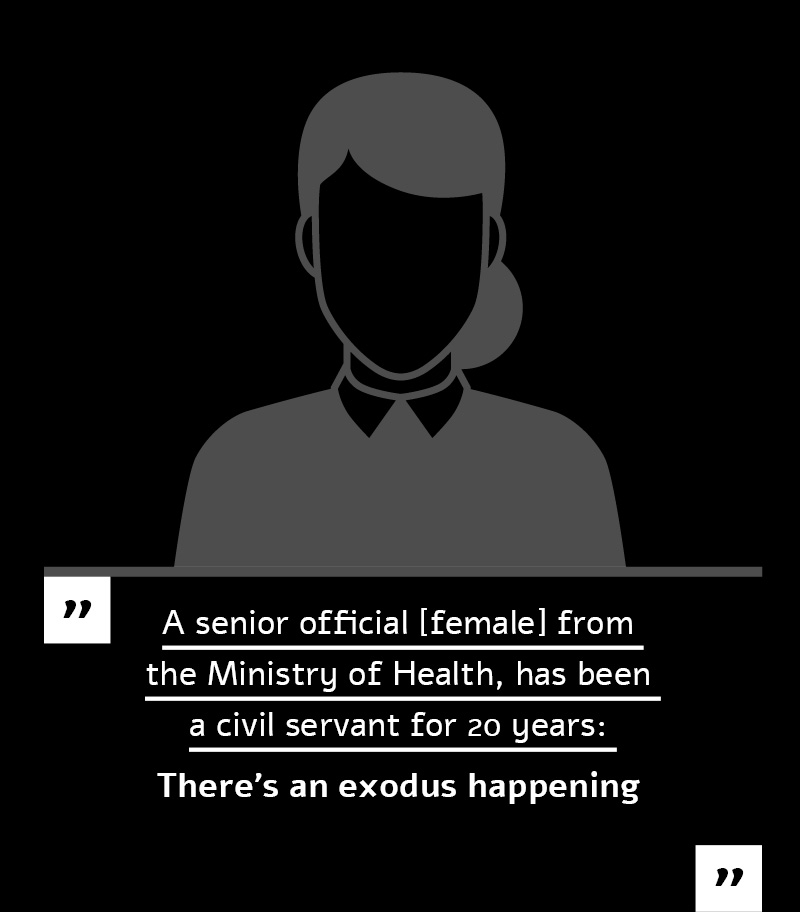
Over the past 20 years, Israel has undergone rapid and welcome development, but here at the Ministry of Health, we have been left at a numerical disadvantage. The workload, the assignments and the demands are only increasing, while staffing levels remain where they were. For example, you could be asked to attend three important meetings of statutory committees in a single day: one in person in Jerusalem, another in Be’er Sheva and the third in Tel Aviv. You have to do some crazy juggling, but you don’t have the basic tools to deal with the challenge, certainly not in terms of the physical conditions or the staffing situation.
I find myself having to beg to fill the critical position. The answer that I keep on getting is, “It’ll be okay, it will happen,” but the years go by and nothing happens; the workload just keeps increasing. Even when my secretary retired, her vacant position wasn’t filled. I’m not a private business and I can’t also be responsible for secretarial duties. I’m one of those old-school civil servants who is dedicated to their job and, primarily, to the public. I joined the public service out of a sense of calling and, for years, I felt that I was getting the basic support I needed to achieve my goals. We worked like a well-oiled machine; we were highly creative and that was the character of the whole civil service.
Unfortunately, that’s no longer the case. There’s a mass exodus going on: people are retiring, but there’s no intake of new staff to replace them and the outcome is obvious – procedures are being delayed and we’re no longer providing the public with a service. There’s no forward planning, the administration is paralyzed, every employee feels the oppressive bureaucracy and the payment is insulting.
3. A former senior official from a key ministry
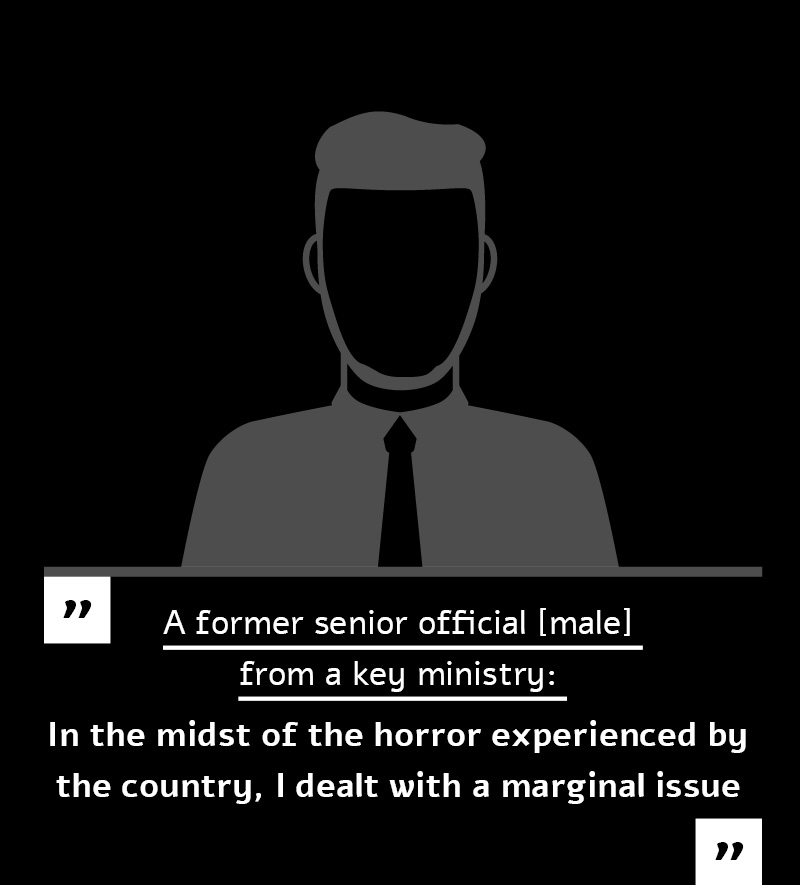
To understand why I retired, you have to go back to the afternoon of October 7. From within the terror that the country was experiencing, I found myself having a phone conversation with the deputy director general of a government ministry. We were both trying to find a solution to a non-emergency problem. I remember how we were both in shock that, of all the critical things that needed handling, this was the issue that we had to deal with. The ministry I worked for plays a critical role in national emergency situations. That moment, when I was knowingly dealing with a marginal issue, was like a punch to the face: I realized that I had turned from an opinionated and unbiased professional into an obedient clerk who carried out orders and avoided confrontations.
In the days that followed, I felt a huge gulf open up: from the outside, Israeli society showed its best side, with people volunteering, assisting, risking themselves for others; within the walls of government ministries, however, everything continued as normal. The senior management in the ministry was most concerned about how we would respond in a timely manner to the media and how we could shuffle blame for insufficient and sluggish responses onto other bodies. Decisions were made and resources allocated based on narrow and calculated political considerations.
We understood that if we want to provide services to the public which truly answer the public’s needs, we would need to work somewhat underground, under the radar of the minister and his spokesperson – and that these moves would not become “marketing material” or used to promote cronies. The discussions and appointments became totally detached from professional foundations and, instead, decisions were made that contradicted plans which had empirically proven themselves to be successful. Reforms that were based on solid data were scrapped without a second thought.
Even after October 7, it took me more than a year before I left. I tried to convince myself that change can only happen from within and that I would be better off starting because maybe I could put my finger in the dike. But the truth is that remaining was a sign that I was turning a blind eye. There was also no way of influencing the senior management. Decisions were being taken against the advice of professionals – and not based on them.
For two decades, I held different roles in several ministries. I have worked under ministers from lots of different parties – each with their own agenda, some of which were far from my own ideology – but everything was always professional. Decisions were weighed against a clear policy. Of late, the only criteria has been how it affects or contributes to them or the people close to them – or to their media persona.
Many others have also left. This exodus has opened the door for a lot of unprofessional people, with the job requirements having been lowered. People lacking any relevant experience have been appointed to key positions. Another practice that has become common is making temporary appointments, so that people are constantly living under the threat of losing their jobs unless they do what the bosses want.
This isn’t just a salacious story about political appointments. It’s about the loss of basic knowledge, experience and familiarity with the system. Loss of the ability to carry things out. This will have ramifications for years to come. It will be very hard to rehabilitate the civil service without professional knowledge, without high-quality professionals who are willing to join the public service and without the public’s faith in the people who are supposed to serve them.
4. A former senior civil servant from the field of planning
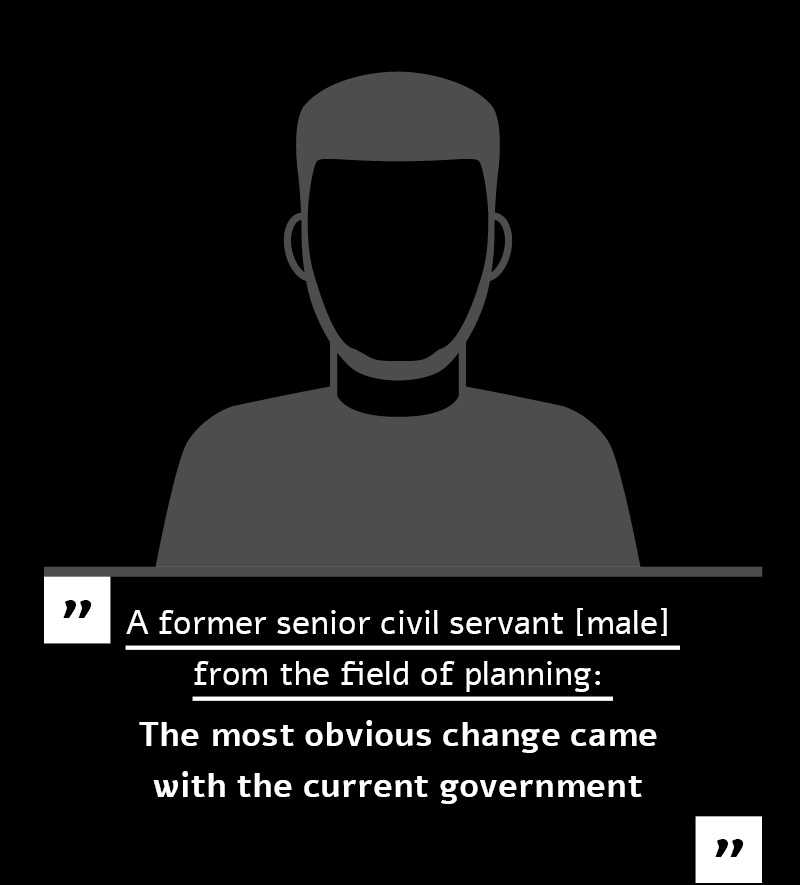
In my position, I interacted a lot with many different officials and organizations. I was involved in planning and decision-making on large infrastructure, energy and transport projects. I know the public sector back to front. Over the years, I have encountered superfluous employees who were just a drain on the system’s resources, who were not willing to think beyond their immediate responsibilities. Alongside them were civil servants who were filled with a sense of mission, who wanted to improve the public sector, to promote innovations and to build systems that functioned better. They encountered red tape but they fought to bring the system forward. Each of them had their own agenda, not everyone was interested in social issues or economic issues; not everyone was environmentally minded and not everyone was against green measures. But even with the differing ideologies, there was fruitful and professional dialogue and, in the end, a balanced decision would be arrived at.
Several positive moves were undertaken: there was more transparency in tenders, failings were studied to avoid repeating them and cover-ups – and there was full cooperation with the state comptroller. The relocation of the Planning Authority to the Ministry of Finance, when Moshe Kahlon was treasurer, allowed us to break down interministerial obstacles and barriers that previously existed. A critical mass of projects that had been put on ice were relaunched.
At some stage, however, that changed. Slowly and gradually, the system began to be dragged into political upheavals. The transition governments halted the momentum of activity: ministers did not advance the issues they were responsible for and genuine problems were brushed under the rug.
For example, there is a forum that discusses obstacles to housing, which is a forum of decision-makers, directors of government ministries and others, which isn’t being convened. The housing cabinet doesn’t meet. All of the forums that were set up to allow directors general to meet, to collaborate, to approve plans and to agree on decisions that have the backing of the professionals in their departments – all of these forums are not functioning. The directors don’t hold working meetings with the high-ranking civil servants and professional echelon and the civil servants are isolated.
The most obvious change came with the current government. It’s been a period of absolute apathy. Nobody is interested in what the professionals have to say. The issues they raise don’t count. Knesset discussions have been scaled back to a minimum. In the past, even if Knesset members were only pretending to be interested, there would be a businesslike meeting in the Knesset, where the professionals could present their facts and figures. Over the past three years, that’s barely happened. And when there is a discussion, ministry representatives don’t show up or the ministry sends some marginal official whose only role is to be present; there’s no preparation, they don’t have any answers and they just mumble their way through the meeting. Total apathy. The ministries do not even bother to send a representative to Knesset discussions. That’s how it starts: Who are you that we should answer to you?
Long-serving colleagues from the transport, energy and housing ministries – as well as the Prime Minister’s Office – have left. Those that remain are doing the bare minimum. While previous Netanyahu governments have always favored their voters, they also did things for the general public. And a lot of decisions were made to improve infrastructure and to provide housing solutions in the Arab sector, to promote environmental issues and a lot of other things that have nothing to do with left or right were handled by the government. Under the current government, however, over the past three-and-a-half years, these issues have simply disappeared from the agenda. They interest absolutely no one. They’re not on the radar. There used to be an approach of ‘Here are some problems, let’s fix them.’ Now it’s a case of ‘Don’t bother me with these issues’.
I don’t mean to glorify past governments; they, too, were guilty of ongoing neglect, severe blunders and unintegrated management – all of which contributed to the housing crisis and to Israel lagging behind in many areas. But, within the system, there were people who effectively raised the banner, conducted studies, made presentations and looked for the right solutions. That was something we talked about at work.
Today, it appears that there are ministers who are not interested in what is happening in their departments. They appointed disinterested directors and a witch hunt was launched to undermine, subjugate and ignore public servants – and to do exactly the opposite of what the professional echelon recommended. The main thing is to get rid of them.
5. An employee of the Ministry of Environmental Protection
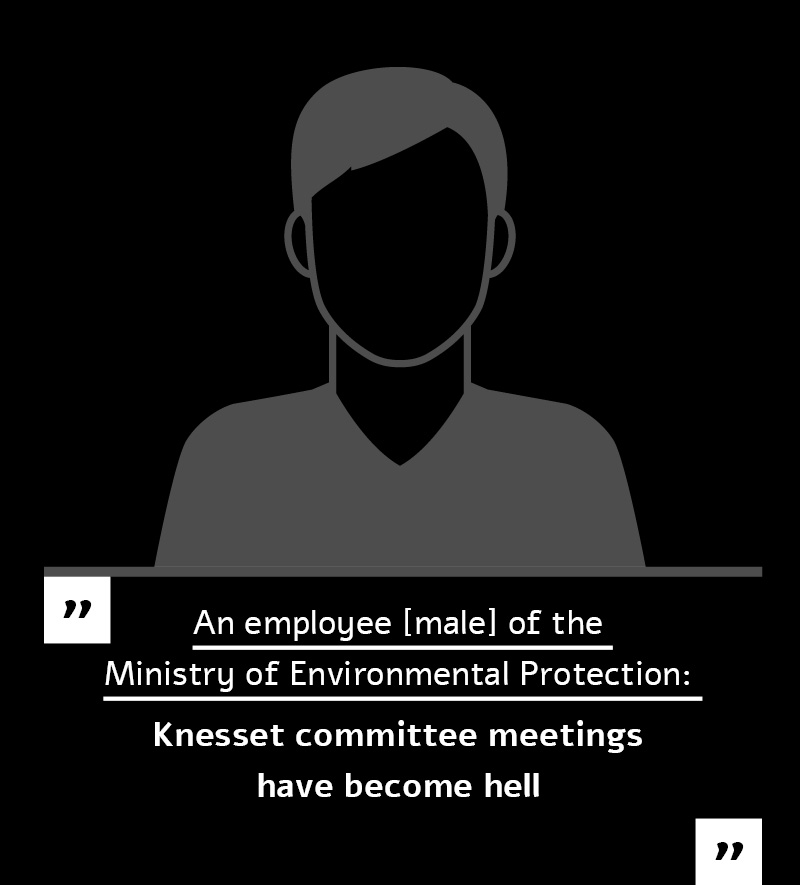
The civil service has been in crisis for years, but, under the current government, we have moved to a state of total collapse over the past two years. There have always been difficulties, political pressure and even corruption, but internal mechanisms protected the professional echelon, the hierarchy, the interaction and the ethical code. Today, these concepts have all but disappeared. These mechanisms safeguarded the professionals and allowed them to make professional decisions.
In the past, anyone who stood up to the minister knew that, as worst, the punishment would be that their promotion would be frozen. I met several senior officials who made professional decisions that went against the opinion of the minister and were left as temporary appointments or not officially promoted for the whole of that minister’s 10-year term. Under current circumstances, anyone who does not do what the minister says is not allowed to remain their position; they are pushed out.
The ministers have already learned the trick of how to get rid of an employee; the Civil Service Commission is no longer strong and, in any case, does not operate according to its own rules; and even the internal departmental mechanisms that safeguarded civil servants – gatekeepers like legal advisors and human resource managers – have been eroded, left or made to leave.
The current government came to destroy it. It is micromanaging to an absurd extent, getting involved in the work of the lowest level civil servant and preventing the publication of professional material. A report that has been two years in the writing could be ignored simply because the minister didn’t like the conclusions. Everything has to be approved by her. At her order, professional material, reports or national planning documents – things that are ready to be published – will never see the light of day, because they clash with her political agenda or it’s just not an interesting or attractive subject for her.
Another phenomenon is ‘personal targeting.’ If a deputy director general decides to impose a fine on a polluting factory, the decision is recorded under his name and not as something decided on by the ministry. That fear seeps down; civil servants start to turn a blind eye, to be more careful of the victims they choose – or they just get weaker, get sick and quit, saying ‘The price isn’t worth it.’
At the same time, there’s also the ‘temporary appointment’ system. Senior positions are filled with temporary employees who are easily subjugated, who are selected on the basis of loyalty and not professionalism. Directors general are positions of trust and too many of them have no idea about the field they are put in charge of. However, the senior ranks under them are professionals who grew up within the ministry. Decisions should be based on their expertise, but they are being worn down.
The distortion and professional erosion of the civil service is so extreme that even ministry directors are throwing up their hands and stepping down voluntarily. In all my years in the civil service, I have never seen so many directors deciding to step down. In the Ministry of Environmental Protection, two directors quit within a year and a half; at the Ministry of Economy, the Ministry of Science, the Ministry of Education and others too.
At the same time, there’s another mechanism working: stopping budgets. The ministry’s financial comptroller, who is subordinate to the Ministry of Finance, can halt processes. Over the past two years, the Ministry of Environmental Protection has found it almost impossible to make any orders. Even when the internal process is over and a supplier has been selected, the comptroller delays it. It’s not random; it’s the system. Money from the Cleanliness Fund, which is earmarked for environmental causes, is not being used and, in the meantime, the treasury is slashing our allocation. That is how they actively foil professional initiatives and channel funds elsewhere.
As a professional civil servant, it’s simply crushing. You work for a year on a tender and then, a year later, the comptroller sends you 10 steps back. I’m not interested in politics – right or left. I have a public mission, not a political one. I cared about what happened in the Jewish sector just as I did about the Arab sector. And if the minister happens to be from an ultra-Orthodox party, I won’t refrain from enforcement in the Haredi sector.
But a campaign has been waged against civil servants and, unfortunately, some of the public buys into it. Knesset committee meetings have become hell; there used to be an atmosphere of respect for and attentiveness to professionalism, but now we’re being silenced, ridiculed and besmirched. You have to remember: if it weren’t for these denigrated civil servants, there would be no one to look out for the public interest. On many occasions, the ‘political interests’ of ministers are actually personal interests, which contradict the public’s interests. The result of all these processes is a continuous erosion of professionalism and a fatal blow to the public sector. We saw what happened previously, during and after October 7. Not a single public system worked. The ministries were out of the picture. And still, within the public sector, I still encountered professionals with values, who are genuinely motivated by a sense of mission.
6. Former senior official at the Civil Service Commission

I dealt with public and governmental corruption for more than two decades and I can see the deteriorating happening in front of my eyes. Until around 10 years ago, investigations were launched into low-level ministerial aides suspected of crimes that today sound like a joke, like failing to adhere to Civil Service Regulations in appointing people to positions of trust. Nowadays, no one would even think about investigating that sort of thing.
During those years, there was also a willingness to investigate senior figures. There were investigations into the then-prime minister’s most senior advisors and also into senior attorneys. That was the period when the law-enforcement system put Ehud Olmert on trial and sent the leaders of the largest criminal gangs to prison. We were held in high esteem and given full backing – and we managed to push through some highly significant reforms. Around the time of the Netanyahu investigations, we got clear messages from above: Don’t investigate senior officials. Employees of the Civil Service Commission found themselves dealing with marginal issues and, at the same time, were prohibited from expressing any independent or critical opinion, which they previously did. The Civil Service Commission, which is responsible for the discipline and ethics of hundreds of thousands of workers, is almost totally paralyzed. The Disciplinary Branch has been neutralized, cases are becoming time-barred and criminals are evading justice.
In addition, there has also been significant politicization in the top echelons. There have always been fixed tenders, but today the political consideration is almost always the primary one. This also seeps down to the intermediate level of management and the result is that unsuitable candidates have been hired.
The Civil Service Commission is supposed to be a central body that is responsible for all human resources, from hiring and onboarding to discipline and retirement. Previous commissioners tried to implement reforms, but they always took small steps. In the absence of rotation, employees can remain in the same position for decades, a situation that creates stagnation, formulaic thinking, and at times even corruption, as the accumulated power over those being supervised is too great.
Another problem is that it is hard to fire civil servants. Disciplinary proceedings can drag on for years and the process for firing someone inadequate is so convoluted that it’s almost impossible. So, the system is stuck with workers who do more harm. Sometimes, they even go after other civil servants, which is something that, in the past, was cracked down on and today is almost ignored. The norms that have been set at the highest echelons – a prime minister who is suspected of accepting gifts and tries to present that as legitimate, a minister who spent time in jail and is now sitting round the cabinet table – have percolated down. Given this reality, conflict-of-interest warnings or disciplinary infractions have become ridiculous.
Responses:
The Civil Service Commission: “There is no interference from any body in the decisions of the Disciplinary Branch and the Investigations Branch of the Civil Service Commission, which are independent bodies subordinate to the State Prosecutor and the Attorney General. The Commissioner does not intervene in decisions regarding investigations and prosecution and his involvement in the field of discipline is limited to suspending employees. There is no directive not to deal with the investigation of senior officials in the civil service. We see great importance in dealing with senior officials who have erred, much more so than dealing with junior employees, as evidenced by the proceedings conducted this year against the director general of the Population Authority, a former financial comptroller and director general of the Galilee Development Authority, the director general of the Chief Rabbinate and the chief of staff of the communications minister.
“As for personnel, under the guidance of the Civil Service Commissioner, a program was developed to improve the organizational structure and additional positions were approved for prosecutors in the Disciplinary Branch, including positions for team leaders, and processes are underway to fill these positions. In 2024, there was an increase in sexual harassment cases; 91 disciplinary lawsuits were filed and 27 defendants were fired in judgments by the Civil Service Disciplinary Court, a wide-ranging scope of activity compared to any parallel enforcement body in this field of work. The Disciplinary Branch and the Investigations Branch will continue to do their work faithfully, without fear and without favoritism.
“The civil service is managed according to the rules set in the Civil Service Law and the Civil Service Regulations, and the tender committees for filling the various positions are also managed according to these rules, without any politicization.”
The Ministry of Health: The ministry is working to expand its workforce, to retain existing workers and to improve working conditions. In recent years, the ministry has significantly increased the number of positions, as well as the resources needed to cover wages. Recruitment processes have been shortened and resources have been invested in dedicated salary agreements for specific professions, such as the agreement for doctors, psychologists and health professions. At the same time, the ministry is increasing its investment in infrastructure and physical conditions.
The ministry operates professional, managerial and technological training programs for employees, alongside welfare solutions and ways to reduce burnout – for example, the establishment of a network of leaders in healthcare organizations to deal with the issue of burnout, creating a response for employees experiencing emotional distress and supporting dozens of dedicated projects in hospitals and HMOs. The Ministry of Health will continue to act for the well-being of its employees with the aim of providing high-quality essential services to the country’s citizens.
The Ministry of Environmental Protection: The ministry regularly receives criticism and sees it as part of public service work. The claims are false, baseless and presented vaguely, without concrete reference to any actual event or case, which paints a distorted picture. Despite a request for examples, not a single reference was received to back the claims. The ministry’s work is based on professional considerations. Reports and programs are published in accordance with the law and transparently and can be found on the ministry’s website. Any attempt to imply otherwise is misleading.
The issuing of fines, orders and actions against polluters is done solely in the name of the ministry and under its responsibility. Ministry employees receive backing for their work and the claim of ‘personal targeting’ is not true. No concrete example was presented to the ministry.
The accusations of a ‘loyalty index’ are baseless. Appointments are made according to the law, to fill positions with suitable professionals. It must be emphasized in this regard that the senior and middle management echelon has been staffed in recent years by professionals who came from the ministry and have been working in it for many years. The management echelon is composed of permanent appointments that went through tender processes. There are no temporary employees in senior roles. Here, too, no specific reference was presented to the ministry.
The Cleanliness Fund and other environmental budgets are consistently used for the public and for environmental projects. There is no basis for the claim that there is a trend to prevent their use; the opposite is true – the ministry is working to use up all available resources. The discussions and decisions are accompanied by legal counsel, and the fund’s management acts in accordance with it.
Regarding Knesset committees, we sometimes witness abusive discourse and disrespectful treatment toward professionals. We can only regret this and clarify that the management completely backs the ministry’s professionals. The ministry’s employees are first-rate professionals who work with dedication, transparency and full integrity. Any attempt to present them as acting out of fear or under a ‘campaign against civil servants’ is unfounded and does not align with reality.”













